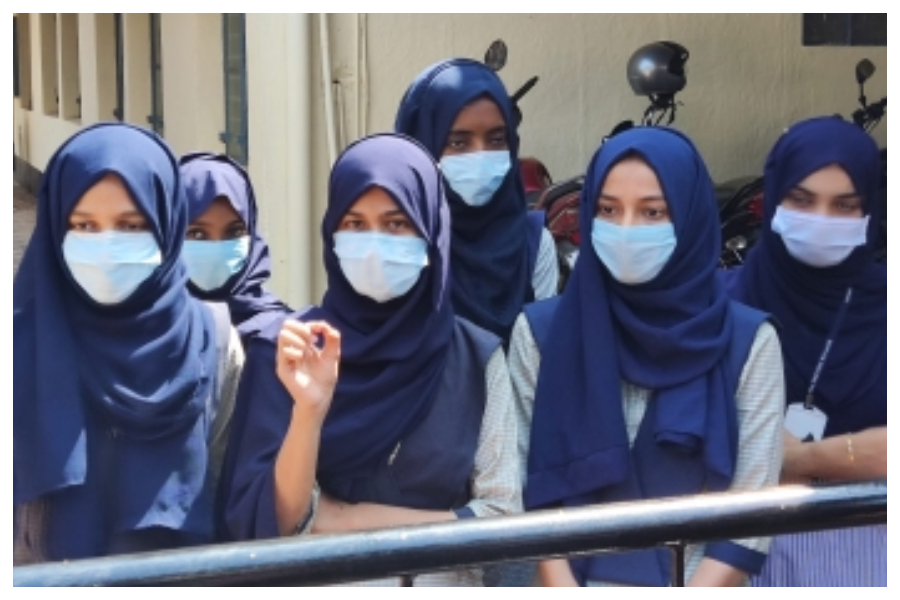Crime
Hijab ruling will have effect on constitutional morality, individual dignity, AG to HC

Karnataka Advocate General Prabhuling Navadgi on Tuesday told the High Court that the judicial decision on hijab will have binding on “constitutional morality” and “individual dignity”.
“When we impose, the element of choice of dress goes away. The woman will be obligated to wear that dress. It becomes compulsory,” he said in his concluding remarks before a three-judge bench, headed by Chief Justice Ritu Raj Awasthi, hearing the hijab row.
“Women cannot be subjugated to any form of dress code and she can’t be made to feel less equal and children of a lesser god. Judicial declaration of every woman of a particular religion to wear hijab, would it not violate the dignity? If it is a compulsion of an attire, it is impermissible on this day.
“We propose no ban on hijab, it should be left to the choice of the woman. Right to privacy cannot be enshrined in public. Institutional discipline is paramount. Dignity of women must also be kept in mind in a plural society,” Navadagi said.
He also quoted a Bollywood song: “Na muh chupake jiyo, na sar jhuka ke jiyo, gamon ka daur bi aaye toh muskura ke jiyo”.
He argued that it is entirely on the petitioner to prove that the practice of hijab is obligatory in nature and compulsorily followed in Islam. However, they have placed 144 Surahs of Quran to the court’s query and there is no record on table to show that the custom is obligatory and it is an element of compulsion which compels a member to be expelled from the community, he added.
“Wearing of dress is freedom of speech, as argued by the petitioners as their fundamental right under Article 19 (1) (a). However, Article 19 (1) (a) is subject to public order, decency under Article 19 (2). In the present case, the uniform rule is subjected to institutional restriction and it is subjected to institutional discipline not only in schools but also in hospitals, military establishments and others,” the AG submitted.
“The rule imposes reasonable restrictions on wearing a headscarf,” he said, adding that a uniform is being prescribed till Pre-University as they have “an impregnable mindset”.
“There is no restriction on campus to wear a hijab. Only during class hours, in the classrooms, it has been not allowed and anything beyond uniforms, irrespective of any religion, is not allowed,” he said.
As Navadgi mentioned the total ban on hijab by France and Turkey in public spaces, Justice Krishna S. Dixit, who is also on the bench, intervened and stated that it depends on the constitutional policy of every country. He then said that he only wanted to bring out that there is no prohibition as such in our country.
Reiterating that hijab is not an essential practice of Islam and can’t come under the Constitution’s Article 25. (Freedom of conscience and free profession, practice and propagation of religion) he sought to bring to the notice of the court that how this has been upheld by various High Courts and Supreme Court judgments.
Giving clear indications of an early verdict on hijab row, the bench had directed counsel to complete their arguments by this week.
Chief Justice Awasthi asked the Advocate General to complete his submissions at the earliest, and he said that he would complete his arguments on Tuesday.
CJ Awasthi informed all counsel that the bench wants to complete the hearing on the case by this weekend and directed them to keep the arguments brief. “Make positive endeavors to complete within this week only,” he said.
Senior advocate R. Venkataramani, appearing for teachers who have been made respondents in the case, maintained that there are no hierarchies of religions between teachers and students. “School environment is more important than a public place. There should be a free mind among students and all minds of children should be in unity for education,” he said.
“Whatever may be the assertion, if the state is in collision with public order, morality and health, it will stop. The state comes in through Article 25 (2) in the matters of religion and finance, when it comes to regulation. There is public space and qualified public space. School is a qualified public space,” he added.
Referring to the verdict of the South African court allowing the wearing of ‘nose ring’ to school there, he stated that the court did not make an emphatic statement of religion in the judgment. “Borrowing from foreign judgments could be problematic here, though we cannot close our eyes on them,” he held.
Senior advocate S.S. Nagananda, who also appeared for teachers, maintained that there is a fine line of distinction as far as culture and religion are concerned. “It is not possible for Muslims to give five time prayers, similarly, it is not possible for a Brahmin to perform Sandhyavandana three times. This practice of wearing hijab is not an essential religious practice. There are some practices, which are required to perform otherwise, they will have consequences,” he said.
Hearing will continue om Wednesday.
Crime
Mumbai: Bangur Nagar Police Book Bajaj Allianz Employee For Allegedly Cheating 69-Year-Old Woman Of ₹6.94 Lakh

Mumbai: The Bangur Nagar police booked an employee of Bajaj Allianz for allegedly cheating a 69-year-old customer out of Rs. 6.94 lakh on the pretext of offering her a pension scheme. The case was registered on September 17. The accused has been identified as Ashish Tiwari, 34, a representative of the firm who resides in Vikhroli West.
According to the FIR, the complainant, Lalita Malhotra, 69, resides in Malad West and teaches classes from second to eighth standard. Her daughter is married and also resides in Malad West, while her son lives abroad. In December 2023, she purchased a five-year policy from Bajaj Allianz Finance. The insurance office is located in Sion. She visited the office and paid her first instalment of Rs. 61,350 via cheque.
In January 2024, Ashish Tiwari called her from the insurance company and requested her to pay the second instalment. She told him that she wanted to close the policy and asked for her money to be returned. Tiwari told her that the policy bonus was due and that her policy value had increased. He further assured her that if she paid the remaining instalments, she would start receiving a pension from November 2024. Trusting him, she was provided a demand letter and transferred a total of Rs. 7.94 lakh to the Google Pay number he provided, in various instalments from May 2024 to February 2025.
Later, she, along with her daughter, visited the insurance office at Andheri East and discovered that while Tiwari was an employee of the company, he had taken the money into his personal account. He returned a small portion of the amount but did not return Rs. 6.94 lakh. She subsequently filed a complaint with the Bangur Nagar police. The police registered the case under Sections 316(2), 316(5) (criminal breach of trust), and 318(4) (cheating) of the Bharatiya Nyaya Sanhita.
Crime
Malad School Case: Mumbai Crime Branch Report Finds No Evidence Of Sexual Assault On 3-Year-Old Girl, Denies Mother’s Allegations

Mumbai: The Mumbai Crime Branch Unit-11 submitted an investigation report regarding the alleged sexual molestation of a 3.6-year-old girl at a high-end school in Malad West on February 12, 2025, to the Maharashtra State Commission for Protection of Child Rights on September 11. Based on the evidence, the report strongly denied that the incident occurred.
According to the report, the victim was safe the entire day at school. After reviewing CCTV footage, recording statements from school staff, doctors from Cloudnine Hospital in Malad West, a neighbour of the complainant, and examining the medical report from Cooper Hospital, it was revealed that the girl and the suspect music teacher were not seen together on that day, and no evidence of a sexual assault was found at any point.
The report claimed that the teacher and other school staff had never heard the word ‘monster’ and claimed the word originated from the complainant and her daughter.
The victim’s 36-year-old mother, an advertising professional, filed a complaint at the Bangur Nagar police station. She had been claiming the ayah (nanny) who took her daughter to the washroom and the male music teacher allegedly molested her child, referring to the teacher as the “monster” who assaulted her.
An FIR was registered on February 13 under Section 64(2) (punishment for rape) of the Bharatiya Nyaya Sanhita, along with Sections 4 (punishment for penetrative sexual assault), 8 (punishment for sexual assault), and 12 (sexual harassment of a child) of the POCSO Act (Protection of Children from Sexual Offences Act).
During the investigation, the girl’s mother filed a petition in the Bombay High Court requesting that the investigation be transferred to another agency. Following the Bombay High Court’s direction, the investigation was handed over to the Crime Branch Unit-11 on July 9, 2025.
According to the Crime Branch report, statements were recorded of Dr. Dehuti Wacchani, 31, and Manasi Verma, 36, of Cloudnine Hospital, who treated the victim. The Crime Branch recorded statements from a total of 22 school staff members, including those from the nursing department, IT department, administration department, assistant staff department (nannies), and teachers.
Additionally, a statement from a 60-year-old female neighbour of the complainant was also recorded. The victim’s statement was recorded in front of her mother, and both the mother’s and the daughter’s statements were recorded before the Metropolitan Magistrate Court in Mazgaon.
After a medical examination was performed at Cooper Hospital in Juhu, the report and the victim’s clothes were sent to the Kalina laboratory. The laboratory’s report stated that ‘neither blood nor semen was detected.’
The investigation report also claimed that the complainant provided a different statement each time she was interviewed. When police asked her to present the girl before the Child Welfare Committee, she did not do so.
According to the victim’s mother, the incident occurred in the washroom of the sick bay. However, the Crime Branch reviewed CCTV footage and found no evidence of the girl arriving at the sick bay on that day. Police reviewed the entire day’s footage and found no objectionable incidents involving the girl until her mother picked her up.
The report claimed that the complainant held a grudge against a male music teacher. The CCTV footage revealed that the victim was not seen with the music teacher at any time on February 12. That day, at 6 pm, the complainant safely took her daughter home via an auto rickshaw. The investigation was conducted by Manohar Avhad, Senior Police Inspector of the Crime Branch Unit-11.
Crime
ED conducts raids in Rs 200-crore bank fraud, benami assets case linked to Sasikala

Chennai, Sep 18: The Enforcement Directorate (ED) on Thursday launched extensive searches in Chennai and Hyderabad in connection with a money laundering probe into an alleged Rs 200 crore bank fraud and benami property dealings linked to V. K. Sasikala, the confidante of late Tamil Nadu Chief Minister J. Jayalalithaa.
Officials confirmed that the searches covered at least ten locations across the two cities.
The premises, according to the source, are connected to a businessman who has been identified as an alleged benami of Sasikala. The raids were conducted under the provisions of the Prevention of Money Laundering Act (PMLA).
The investigation stems from a case registered by the Central Bureau of Investigation (CBI), which had earlier filed an FIR over what it described as fraudulent banking transactions running into hundreds of crores.
Acting on this, the ED initiated its own money laundering probe to trace the flow of funds and identify properties suspected to have been acquired through illegal means or in the names of benami holders.
Sources said officials are seizing documents, financial records, property deeds and electronic evidence from the searched locations. These materials will be examined to establish links between the bank fraud and assets allegedly concealed through benami arrangements.
While the extent of seizures is not yet clear, officials indicated that the raids were aimed at unearthing the full scale of transactions connected to the case.
The action once again puts Sasikala back in the spotlight. A key player in Tamil Nadu politics for decades, she has previously faced allegations and legal battles over disproportionate assets.
The ED’s current move revives scrutiny into her financial networks, particularly through associates and business entities suspected to have acted as fronts.
Investigators are likely to expand the probe depending on the findings from the ongoing searches. If evidence of laundering or concealment is confirmed, assets may be provisionally attached under PMLA, and further charges could follow.
The raids have drawn political attention as well, with observers noting that the timing and the scale of the operation underscore the central agency’s renewed focus on high-profile economic offences in Tamil Nadu.
-

 Crime3 years ago
Crime3 years agoClass 10 student jumps to death in Jaipur
-

 Maharashtra12 months ago
Maharashtra12 months agoMumbai Local Train Update: Central Railway’s New Timetable Comes Into Effect; Check Full List Of Revised Timings & Stations
-

 Maharashtra11 months ago
Maharashtra11 months agoMumbai To Go Toll-Free Tonight! Maharashtra Govt Announces Complete Toll Waiver For Light Motor Vehicles At All 5 Entry Points Of City
-

 Maharashtra12 months ago
Maharashtra12 months agoFalse photo of Imtiaz Jaleel’s rally, exposing the fooling conspiracy
-

 National News11 months ago
National News11 months agoMinistry of Railways rolls out Special Drive 4.0 with focus on digitisation, cleanliness, inclusiveness and grievance redressal
-

 Crime11 months ago
Crime11 months agoBaba Siddique Murder: Mumbai Police Unable To Get Lawrence Bishnoi Custody Due To Home Ministry Order, Says Report
-

 Maharashtra10 months ago
Maharashtra10 months agoMaharashtra Elections 2024: Mumbai Metro & BEST Services Extended Till Midnight On Voting Day
-

 National News12 months ago
National News12 months agoJ&K: 4 Jawans Killed, 28 Injured After Bus Carrying BSF Personnel For Poll Duty Falls Into Gorge In Budgam; Terrifying Visuals Surface












